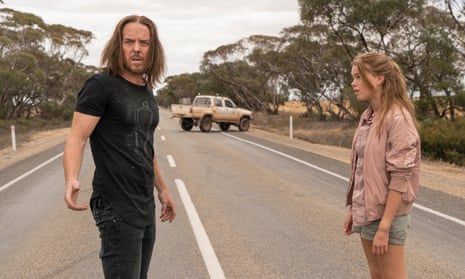It has taken nearly 4,000 miles, but we got there in the end. Not quite to Upright’s final destination of Perth. The race is still on for the protagonist Lucky (played by the comedian and musician Tim Minchin, in his first dramatic role) to return the family piano to his childhood home before his mother dies. But we have discovered the secrets that drove him and teenager Meg (Milly Alcock) out of their respective homes and together for a cross-country road trip after they crashed into each other (literally) on the road out of Sydney.
Our odd couple continue to thwart the fates that seem intent on stopping them, while there is still time for Lucky’s mother to be reunited with her beloved instrument and her boy. In the latest episodes, which are broadcast in pairs on Sky Atlantic, the fates communicate through the large body of a camel, into which Meg crashes. There is a camel funeral and if you didn’t think you could cry at an ungulate burial, you would be wrong.
Meg has run away from home, it emerges, because her brother died and her father descended into depression and drink as a result. The depth of her and Lucky’s bond, which has deepened over time – a stolen prescription form here, a breakfast chocolate croissant there, a shared moment of bafflement over whether old tampons “go off” – is proved; Lucky ditches his piano to dedicate himself to reuniting Meg with her mother in Kalgoorlie. The man-child is growing up, just slightly, to take care of this girl forced by circumstance to grow up too fast.
But Meg will not hear of it. She says they must go back for the piano, so back for the piano they go. Which this time involves tracking it down in a salvage yard, trading it for the ute then stealing a truck, accidentally letting loose the horse in the box at the back, swapping the ute’s plates for the stolen truck’s to buy them some time and setting off again.
But the fun in Upright is always shot through with misery, and as the pair’s capers unspool, we also learn what drove Lucky away from his home for eight years: an abiding love for his brother’s wife that culminated in a drunken confession to her and them going to bed. His brother – and his mother – found out, so he had to go.
At the filling station near the salvage yard, Lucky receives a message from his brother saying he is “too late”. As he collapses, grief-stricken, it is Meg who finds out the truth: that his mother is not dead, but in a coma. A second chance. They and the piano resume their journey and there is even better news to come in the closing scenes; his mother is conscious again. Now it’s just a question of dropping Meg off in Kalgoorlie and driving on to Perth. All they have to do is avoid any more camels.
I will be honest: I have forged ahead and watched to the end. There are many more camels, figuratively speaking, handled with Upright’s customary aplomb. It remains pretty much note-perfect throughout, somehow playing harmoniously in the keys of melancholy and comedy at the same time, a function of the gorgeous writing (by the reator Chris Taylor, with Leon Ford, Kate Mulvaney and Minchin) but also the masterly direction by Matthew Saville (whose work on Please Like Me marshalled the same contradictory, complementary forces).
Minchin’s manic energy is transmuted here into something much darker and more powerful; you can feel his suffering even as he somehow retains the light comic touch that vitally leavens the whole. And newcomer Alcock is – from the first minute she appears roaring expletives at “the weird Chewbacca guy” – a shining talent who seems to have landed on our screens fully formed. Her Meg is always so much more than a merely angry teenager, her combative attitude as much a genuine part of her as a response to her circumstances, and her comic timing is as flawless as her co-star’s.
If the finale loses the absolute delicacy of touch that has marked the rest of the series, as the large emotions surface at last, that is a vanishingly small criticism of an offbeat, charming and moving creation from Minchin and everyone else. It was beaut.

Comments (…)
Sign in or create your Guardian account to join the discussion